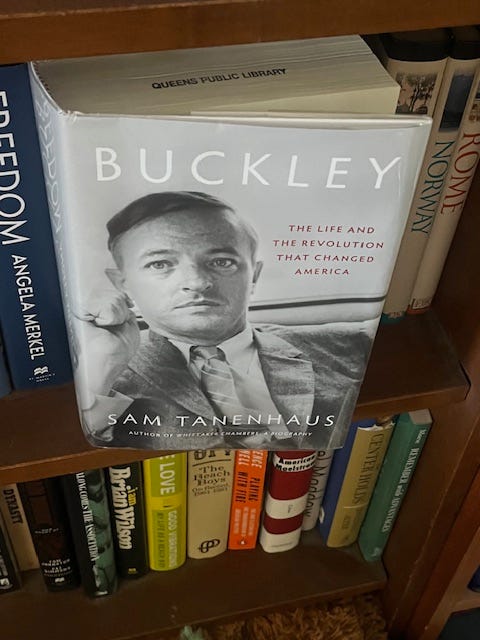I haven’t thought much about William F. “Bill” Buckley, Jr. over the years. Of course, I am familiar with him and know of his influence in the conservative political movement. But I hardly ever watched Firing Line or read National Review, or his columns or his books. It’s not that I ignored conservatives. Over the years I enjoyed watching Pat Buchanan, Robert Novak and George Will on The Capital Gang, The McLaughlin Group and Agronsky & Company. I remember James J. Kilpatrick sparring with Nicholas Von Hoffman on 60 Minutes. Most of my exposure to Buckley was probably watching comedian David Frye’s impersonations of him.
Last month I read an article in The Atlantic “What Made William F. Buckley So Unusual.” on a new book “Buckley, The Life and The Revolution That Changed America by Sam Tanenhaus.” I found the interview with the author by Cullen Murphy interesting and thought it might be a book I could read. The page length of over 1,000 sounded too long a read. But it’s been a couple of months since I read a book and after my most recent reads were about The Bangles and Crosby, Still Nash and Young, it is time for something different. I ordered it from the local library. You can request books from The New York Public Library and, if and when they receive it, they will mail it to your local branch. You have three weeks to read it and then you can renew it twice.
It’s true I’m retired, it was the 4th of July weekend, and I have time on my hands. But I read the book in eight days. I could not put it down. Bill Buckley lived from 1925-2008 but the focus is from the early 1940s, when he was against America getting involved in World War 2 and admired Charles Lindbergh to the election of Ronald Reagan as President in 1980. One important position he took, such as being against The Civil Rights Movement and for Resistance in the South he would later regret. The one thing he realized, after watching Tom Dewey be defeated by Harry Truman in 1948 is that there was a real hunger on the (far) right for candidates, they could really get excited about such as Barry Goldwater and Ronald Reagan. Today we call it “firing up the base.” Through his media empire he helped build the conservative movement. Bill Buckey was happy to talk to everyone and made many friends with those who disagreed with him. The book mentioned there was Bill the Ideologue and Bill the Friend. The book explains through his businessman father and his upbringing why he made the personal, professional and political decisions that he did and why they would be different than what you and I would do. Many biographies of this length I skim over certain sections because I am not interested in some issue that was important back then. But growing up, I remember all these matters and read every word. The author thinks highly of Bill Buckley but also covers some lowlights of his life including some poor business decisions which nearly bankrupt him. Bill’s very entertaining 1965 New York City Mayoral campaign is covered as is his brother James Buckley’s successful 1970 New York Senate Campaign. The infamous 1968 Bill Buckley-Gore Vidal ABC TV debates at the political conventions from 1968 are certainly analyzed and Bill Buckley comes across very badly. It went much better in 1972 when Bill Buckley covered the political conventions with his long-time debating adversary and personal friend John Kenneth Galbraith on NBC’s Today Show. The New York Times review of this book concludes; Tanenhaus calls Buckley the “intellectual leader” of American conservatism, but we might remember him more accurately as its original influencer.
Unless there’s a coffee table book of one of your heroes, I never insist someone spend $40 on a book. But if you can get Buckley, The Life and Revolution That Changed America from your library, I recommend it. Then when people ask you, “What have your read recently?” you can tell them you read a 1,000 page book of William F. Buckley. These days William F. Buckley is not (and never was) as controversial as Donald Trump or Zohran Mamdani. People will not judge you, conclude you are well read and move on to discussing the weather or something else.




